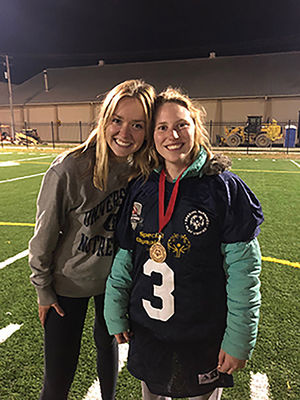In 2007, when my husband and I were considering a move to South Bend from a New Orleans suburb, we had three children and were past our impetuous phase. So we did what any practical parents would do. We grabbed a yellow legal pad and printed a list of pros and cons in tidy columns. We would miss family and friends, the French Quarter and the food, but not the commute across the 24-mile-long causeway or the scourges of a Southern summer.
But we had a bigger question. How well would the community support people with intellectual disabilities? This was critical because one of our twins has cerebral palsy, and we had spent years constructing a robust network of trusted doctors, therapists and teachers we couldn’t bubble-wrap and take north.
You can tell a lot about a place by how it treats its most vulnerable; how would South Bend measure up?
As a Notre Dame student, I had taught swim lessons on Saturday mornings at a place called Logan Center, located where Eddy Street Commons stands today. I knew it served people with developmental disabilities but not much else. From watching the football broadcasts, I also knew about a project in the works by then-head coach Charlie Weis called Hannah & Friends, named for his daughter with special needs.
I emailed Hannah & Friends to seek advice about schools, and a personal reply popped into my inbox from Maura Weis, Charlie’s wife and Hannah’s mom. While she was launching a nonprofit service and parenting a child with special needs, she paused to help me. Hannah & Friends envisioned a bucolic neighborhood with a gym and community building, even a barn with horses for wagon rides. Was this for real?

After we moved, we discovered Logan Center occupied an impressive new building on Jefferson Boulevard with lots of natural light and pristine equipment. We dove into everything: cooking classes, museum visits, camping trips with Notre Dame students, even a prom. They also offer plenty of services we didn’t need — an autism program, group homes, adult day services, even protective service guardians.
While the Mother Teresas of the world have proven you can serve others with the bare minimum of resources, the people of South Bend seemed to say, “We care about what happens to our citizens with special needs. And we care enough to invest in serving them well.”
Across town at Hannah & Friends, our daughter sang karaoke with gusto and trained for 5K runs by jogging along the pastures. At Christmastime, we dropped her off at their gym to “shop” in secret for presents to give the rest of us. Helper elves guided her along tables piled with donated items and then wrapped her selections. She emerged with her arms wrapped around an unwieldy shopping bag and a smile so wide her nose wrinkled up.
These two organizations pointed us to others. We joined a group called SOLO — Special Outdoor Leisure Opportunities — that teaches people with intellectual disabilities to ski with adaptive gear. The same folks who founded SOLO 41 years ago still volunteer as skiing partners. Layered in thermals and parkas, they troop onto the bus each Monday after work, headed for Michigan. Everyone belongs.
We discovered Camp Millhouse on the southwest side of South Bend, a summer camp for outdoorsy folks of all abilities. Outfitted with cabins, a pool, a ropes course and campfire circles, the disability camp doesn’t age-out campers as some others do. The list of robust opportunities around South Bend goes on, from Special Olympics to Best Buddies.
Some of the finest people I’ve known are the scaffolding of these groups.
People like Kitty, who could lead a master class in crafting bookmarks and notecard art, and Dana, whose Saturday nights have her slicing pizzas and busting moves to pop songs in Logan’s activity room. People like Kayle, who gives Hannah & Friends’ participants her cell number and responds to their texts with sweet patience and genuine interest.
People with developmental delays need more help than their families can give, and they want to flourish in society, not simply survive. Special-needs children grow into special-needs adults who want jobs to feel productive and friends to feel human. To say it’s difficult having a family member with an intellectual disability seems too benign. It’s not simply difficult, but terribly difficult at times.
When things flare up into those piercingly painful moments, special healers are a soothing balm. We’ve been awash in such people since we moved here.
About a year ago, I went to Florida to produce a story about Notre Dame’s oldest living alumnus, Joe Newman ’36, now 107 years old. Joe, receiving an award for a lifetime of service, had lived in South Bend for most of his life and still has that Midwestern humility mixed with compassion and tenacity. He’s accomplished things that would impress you and make you laugh.
Serendipity brought me to his living room. The moment I had been anticipating came when I told him my daughter went to Logan. His face softened and he smiled. In 1950, Joe and his wife, Sophie, founded Logan for kids like their daughter, Rita Jo. Over half a century later, I had the chance to thank him in person.
Beth Grisoli is director of multimedia in Notre Dame’s Office of Public Affairs and Communications.